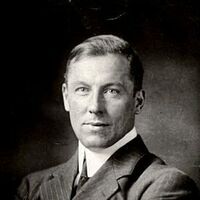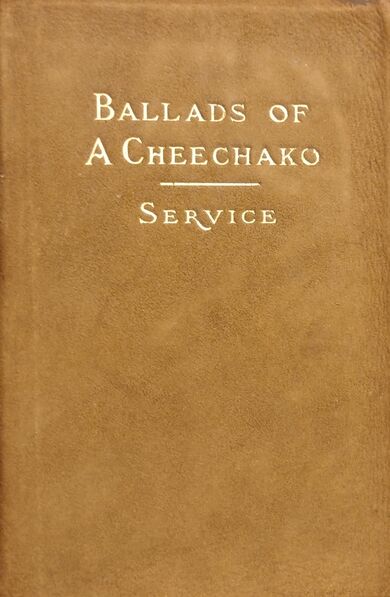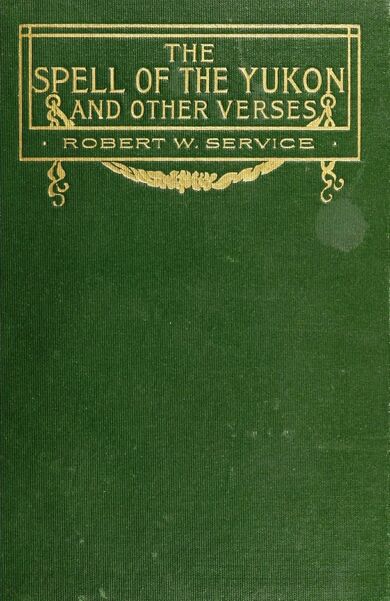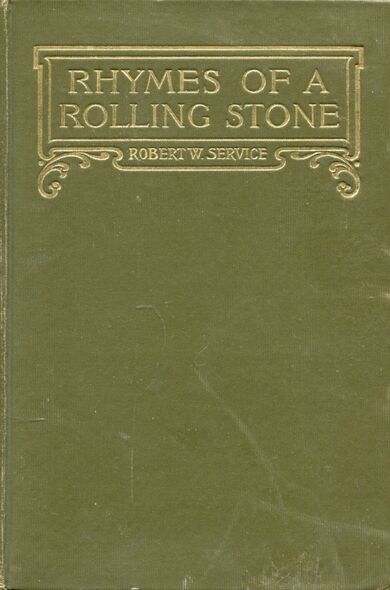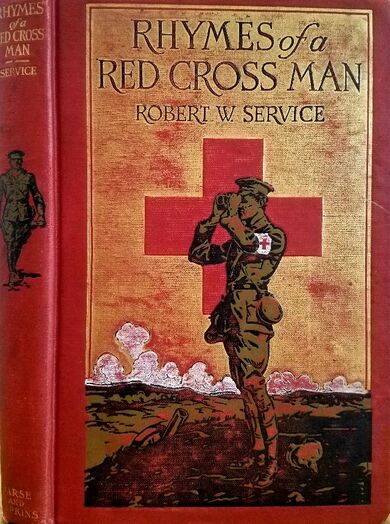The Pencil Seller
A pencil, sir; a penny —won’t you buy?
I’m cold and wet and tired, a sorry plight;
Don’t turn your back, sir; take one just to try;
I haven’t made a single sale to—night.
Oh, thank you, sir; but take the pencil too;
I’m not a beggar, I’m a business man.
Pencils I deal in, red and black and blue;
It’s hard, but still I do the best I can.
Most days I make enough to pay for bread,
A cup o’ coffee, stretching room at night.
One needs so little —to be warm and fed,
A hole to kennel in —oh, one’s all right . . .
Excuse me, you’re a painter, are you not?
I saw you looking at that dealer’s show,
The croûtes he has for sale, a shabby lot —
What do I know of Art? What do I know . . .
Well, look! That David Strong so well displayed,
“White Sorcery” it’s called, all gossamer,
And pale moon—magic and a dancing maid
(You like the little elfin face of her?) —
That’s good; but still, the picture as a whole,
The values, —Pah! He never painted worse;
Perhaps because his fire was lacking coal,
His cupboard bare, no money in his purse.
Perhaps . . . they say he labored hard and long,
And see now, in the harvest of his fame,
When round his pictures people gape and throng,
A scurvy dealer sells this on his name.
A wretched rag, wrung out of want and woe;
A soulless daub, not David Strong a bit,
Unworthy of his art. . . . How should I know?
How should I know? I’m Strong —I painted it.
There now, I didn’t mean to let that out.
It came in spite of me —aye, stare and stare.
You think I’m lying, crazy, drunk, no doubt —
Think what you like, it’s neither here nor there.
It’s hard to tell so terrible a truth,
To gain to glory, yet be such as I.
It’s true; that picture’s mine, done in my youth,
Up in a garret near the Paris sky.
The child’s my daughter; aye, she posed for me.
That’s why I come and sit here every night.
The painting’s bad, but still —oh, still I see
Her little face all laughing in the light.
So now you understand. —I live in fear
Lest one like you should carry it away;
A poor, pot—boiling thing, but oh, how dear!
“Don’t let them buy it, pitying God!” I pray!
And hark ye, sir —sometimes my brain’s awhirl.
Some night I’ll crash into that window pane
And snatch my picture back, my little girl,
And run and run. . . .
&n bsp; &nb sp; &nbs p;
I 'm talking wild again;
A crab can’t run. I’m crippled, withered, lame,
Palsied, as good as dead all down one side.
No warning had I when the evil came:
It struck me down in all my strength and pride.
Triumph was mine, I thrilled with perfect power;
Honor was mine, Fame’s laurel touched my brow;
Glory was mine —within a little hour
I was a god and . . . what you find me now.
My child, that little, laughing girl you see,
She was my nurse for all ten weary years;
Her joy, her hope, her youth she gave for me;
Her very smiles were masks to hide her tears.
And I, my precious art, so rich, so rare,
Lost, lost to me —what could my heart but break!
Oh, as I lay and wrestled with despair,
I would have killed myself but for her sake. . . .
By luck I had some pictures I could sell,
And so we fought the wolf back from the door;
She painted too, aye, wonderfully well.
We often dreamed of brighter days in store.
And then quite suddenly she seemed to fail;
I saw the shadows darken round her eyes.
So tired she was, so sorrowful, so pale,
And oh, there came a day she could not rise.
The doctor looked at her; he shook his head,
And spoke of wine and grapes and Southern air:
“If you can get her out of this,” he said,
“She’ll have a fighting chance with proper care.”
“With proper care!” When he had gone away,
I sat there, trembling, twitching, dazed with grief.
Under my old and ragged coat she lay,
Our room was bare and cold beyond belief.
“Maybe,” I thought, “I still can paint a bit,
Some lilies, landscape, anything at all.”
Alas! My brush, I could not steady it.
Down from my fumbling hand I let it fall.
“With proper care” —how could I give her that,
Half of me dead? . . . I crawled down to the street.
Cowering beside the wall, I held my hat
And begged of every one I chanced to meet.
I got some pennies, bought her milk and bread,
And so I fought to keep the Doom away;
And yet I saw with agony of dread
My dear one sinking, sinking day by day.
And then I was awakened in the night:
“Please take my hands, I’m cold,” I heard her sigh;
And soft she whispered, as she held me tight:
“Oh daddy, we’ve been happy, you and I!”
I do not think she suffered any pain,
She breathed so quietly . . . but though I tried,
I could not warm her little hands again:
And so there in the icy dark she died. . . .
The dawn came groping in with fingers gray
And touched me, sitting silent as a stone;
I kissed those piteous lips, as cold as clay —
I did not cry, I did not even moan.
At last I rose, groped down the narrow stair;
An evil fog was oozing from the sky;
Half—crazed I stumbled on, I knew not where,
Like phantoms were the folks that passed me by.
How long I wandered thus I do not know,
But suddenly I halted, stood stock—still —
Beside a door that spilled a golden glow
I saw a name, my name, upon a bill.
“A Sale of Famous Pictures,” so it read,
“A Notable Collection, each a gem,
Distinguished Works of Art by painters dead.”
The folks were going in, I followed them.
I stood upon the outskirts of the crowd,
I only hoped that none might notice me.
Soon, soon I heard them call my name aloud:
"A `David Strong’, his Fete in Brittany."
(A brave big picture that, the best I’ve done,
It glowed and kindled half the hall away,
With all its memories of sea and sun,
Of pipe and bowl, of joyous work and play.
I saw the sardine nets blue as the sky,
I saw the nut—brown fisher—boats put out.)
“Five hundred pounds!” rapped out a voice near by;
“Six hundred!” “Seven!” “Eight!” And then a shout:
“A thousand pounds!” Oh, how I thrilled to hear!
Oh, how the bids went up by leaps, by bounds!
And then a silence; then the auctioneer:
“It’s going! Going! Gone! Three thousand pounds!”
Three thousand pounds! A frenzy leapt in me.
“That picture’s mine,” I cried; “I’m David Strong.
I painted it, this famished wretch you see;
I did it, I, and sold it for a song.
And in a garret three small hours ago
My daughter died for want of Christian care.
Look, look at me! . . . Is it to mock my woe
You pay three thousand for my picture there?” . . .
O God! I stumbled blindly from the hall;
The city crashed on me, the fiendish sounds
Of cruelty and strife, but over all
“Three thousand pounds!” I heard; “Three thousand pounds!”
There, that’s my story, sir; it isn’t gay.
Tales of the Poor are never very bright . . .
You’ll look for me next time you pass this way . . .
I hope you’ll find me, sir; good—night, good—night.

